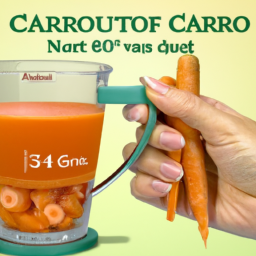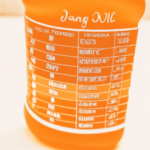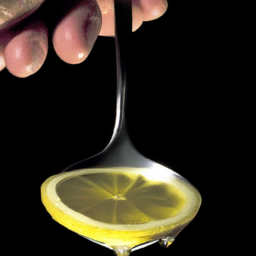As a person who likes to kick start their day with a refreshing glass of orange juice, I frequently ponder the shelf life of the juice. Because orange juice is a perishable item, understanding when it is no longer suitable for consumption is crucial.
In this article, I will explore the factors that affect orange juice shelf life, the signs of spoiled orange juice, and tips for extending its shelf life.
First, it is important to understand the composition of orange juice. Orange juice is made up of water, sugar, vitamins, minerals, and organic acids. These components contribute to the nutritional value of the juice, but they also play a role in its shelf life.
The acidity of orange juice helps to slow down the growth of bacteria, but it can also contribute to spoilage over time. Other factors, such as temperature, exposure to light, and the presence of oxygen, can also affect orange juice shelf life. By understanding these factors, we can better understand how long it takes for orange juice to go bad and how to prevent spoilage.
Key Takeaways
- Factors that affect orange juice shelf life include temperature, light exposure, and oxygen presence.
- Proper storage conditions such as refrigeration, airtight containers, and attention to use-by dates are crucial for maintaining freshness and quality.
- Signs of spoiled orange juice include foul smell, cloudy appearance, separation of solids, and sour taste.
- Freezing can extend orange juice shelf life up to a year, and using preservatives such as ascorbic acid can help prolong orange juice freshness and quality.
Overview of Orange Juice Composition and Nutritional Value
Orange juice is a tasty and nutritious beverage that contains essential vitamins and minerals. It’s rich in vitamin C, folate, and potassium, which are necessary for maintaining good health. Drinking orange juice is known to have many benefits, including boosting the immune system, reducing inflammation, and improving heart health.
However, it’s important to note that there are also health risks associated with orange juice. Because it’s high in sugar, drinking too much of it can lead to weight gain and other health problems. Additionally, some orange juice products may contain added sugars or preservatives, which can be harmful to the body. When consuming orange juice, it’s important to choose products that are low in sugar and free from additives.
Factors that affect orange juice shelf life include temperature, exposure to air, and the presence of bacteria. These factors can cause the juice to spoil and lose its nutritional value over time. Therefore, it’s important to store orange juice in a cool, dry place and to consume it before the expiration date.
By understanding the composition and factors that affect orange juice, we can make informed decisions about its consumption and ensure that we’re getting the most nutritional value from this delicious beverage.
Factors that Affect Orange Juice Shelf Life
As I delve deeper into the topic of orange juice shelf life, I’ve discovered several factors that significantly affect it. The type of orange used, processing method, storage conditions, heat, and light are all crucial factors that can either extend or shorten the shelf life of the juice.
By understanding these factors, it becomes easier to determine the best way to store and preserve orange juice to ensure its quality and nutritional value.
Type of Orange
If you’re a fan of sweet and juicy Valencia oranges, your fresh squeezed orange juice will stay delicious for up to 5 days in the fridge. The sweetness level of Valencia oranges is higher than other types of oranges, which contributes to their longer shelf life.
Additionally, Valencia oranges have lower acidity levels compared to other varieties, which slows down the growth of bacteria and other microorganisms that can spoil the juice. When it comes to orange juice, the type of orange used can make a big difference in how long it stays fresh.
In addition to Valencia oranges, other varieties like Navel and Hamlin oranges also make delicious juice. However, their lower sweetness and higher acidity levels mean that their juice may not last as long as Valencia orange juice.
Moving on to the next section, another factor that affects orange juice shelf life is the processing method used.
Processing Method
By using the right processing method, you can enjoy the freshly squeezed orange juice with all its nutrients intact and a flavor that will make your taste buds dance. Juice processing techniques play a significant role in determining the shelf life of fresh squeezed orange juice. When it comes to preserving the nutritional value and taste of orange juice, the processing method must be carefully selected.
To better understand the impact of different processing methods on the shelf life of orange juice, consider the following table:
| Processing Method | Shelf Life |
|---|---|
| Pasteurization | 2-4 weeks |
| High Pressure Processing (HPP) | 4-6 weeks |
| Ultra-High Temperature (UHT) | 6-9 months |
As you can see, pasteurization is the most commonly used method, but it has the shortest shelf life compared to HPP and UHT. HPP, on the other hand, is a non-thermal method that allows juice to be stored for a longer period without sacrificing taste and nutritional quality. UHT, which is a thermal method, is known for its extended shelf life, but it may affect the taste and nutritional value of the juice. Overall, the choice of processing method depends on the desired shelf life and the desired sensory attributes of the juice.
When it comes to storing orange juice, the storage conditions play a crucial role in determining its shelf life.
Storage Conditions
Proper storage conditions are crucial for maintaining the freshness and quality of freshly squeezed orange juice. The effects of temperature and humidity on orange juice storage are significant. It is best to store orange juice in a cool and dry place, away from direct sunlight.
The ideal temperature for storing orange juice is between 32°F to 40°F. At this temperature, the juice can last for up to two weeks. Moreover, the container in which orange juice is stored also plays a crucial role. It is best to store orange juice in airtight containers that are made of glass or plastic. These containers prevent the juice from getting in contact with air, which can cause oxidation and spoilage.
Proper storage conditions and the right choice of containers can significantly extend the shelf life of orange juice. In the next section, we will discuss the effects of heat on orange juice storage. Heat can cause significant damage to the quality and freshness of orange juice.
Heat
To maintain the freshness and quality of your freshly squeezed orange juice, it’s important to be cautious of the effects of temperature on storage. Orange juice is particularly sensitive to heat, which can accelerate the growth of bacteria and spoilage.
The ideal temperature range for storing orange juice is between 32°F and 39°F. This helps to slow down the spoilage process and extend its shelf life.
The impact of climate on orange juice spoilage cannot be overlooked. In hot and humid environments, the spoilage process of orange juice can be accelerated due to the increased temperature and moisture in the air.
This makes it important to store orange juice in a cool and dry place, away from direct sunlight and heat sources. By taking these precautions, you can extend the shelf life of your orange juice and enjoy its fresh taste for longer.
Speaking of storage, let’s now discuss the impact of light on orange juice spoilage.
Light
If you want to preserve the fresh taste of your orange juice, it’s important to consider the impact of light on its spoilage. Light exposure can cause a chemical reaction in the juice that leads to a loss of flavor and nutrients. Specifically, UV radiation from sunlight can break down the compounds in the juice and cause a rancid, sour taste.
To avoid light damage, it’s best to store your orange juice in a cool, dark place, such as a refrigerator or pantry. Light can also penetrate through clear plastic containers, so it’s important to choose opaque containers that block out UV rays. By protecting your orange juice from light exposure, you can extend its shelf life and enjoy a fresh, delicious taste for longer.
Now, let’s move on to the next section about exposure to air and its impact on orange juice spoilage.
Exposure to Air
When you leave your glass of orange juice out on the table, tiny oxygen molecules start to seep into the liquid, causing it to lose its vibrant color and turn a dull shade of brown. This is due to the effects of oxidation, a process in which the oxygen molecules react with the juice’s natural compounds, altering its taste, texture, and nutritional value. The longer the juice is exposed to air, the greater the degree of oxidation, and the faster it will spoil.
To minimize the exposure of orange juice to air and slow down the spoilage process, it’s important to store it in an airtight container and refrigerate it as soon as possible after opening. This way, fewer oxygen molecules can enter the juice, and the cold temperature can slow down the rate of chemical reactions. Additionally, adding antioxidants to the juice can help prevent or delay oxidation, as they can react with the oxygen molecules before they attack the juice’s compounds. By taking these ways to minimize exposure to air, we can extend the shelf life of orange juice and enjoy its freshness for a longer time.
Understanding the spoilage process of orange juice involves a deeper understanding of its chemical composition and the factors that can affect its stability.
Understanding the Spoilage Process
As the days pass, the natural enzymes in orange juice begin to break down the sugars and acids, causing the juice to turn sour and lose its fresh taste like a flower wilting in the sun. Understanding the spoilage process helps in preventing spoilage through proper storage. Here are three things to keep in mind:
-
Oxygen is the enemy: Exposure to air causes oxidation, which changes the color and flavor of orange juice. This is why it’s important to store orange juice in an airtight container to minimize air exposure.
-
Temperature matters: Orange juice should be kept cold at all times to slow down the spoilage process. Ideally, it should be stored at temperatures below 40°F.
-
Light can be harmful: Light can break down the nutrients in orange juice, making it less nutritious over time. It’s best to store orange juice in a dark and cool place.
By following these guidelines, you can prolong the shelf life of orange juice and prevent spoilage. However, it’s important to be aware of the signs of spoiled orange juice, which we’ll discuss in the next section.
Signs of Spoiled Orange Juice
Understanding the Spoilage Process of orange juice is crucial in identifying the Signs of Spoiled Orange Juice. As an AI language model, I do not have the ability to taste or smell the juice, but I can provide you with some indicators of spoilage. When orange juice is exposed to air, light, and heat, it begins to deteriorate. Bacteria, yeast, and mold can also contaminate the juice, causing it to go bad even faster.
To identify if your orange juice has gone bad, look for changes in color, taste, and smell. A handy table below shows the common signs of spoiled orange juice, the potential contaminants, and the possible health effects. It is essential to note that consuming spoiled orange juice can lead to foodborne illnesses, so it is best to dispose of it if there are any signs of spoilage.
In the next section, we will dive deeper into the shelf life of orange juice and answer the question, "How long does orange juice last?".
| Signs of Spoiled Orange Juice | Common Contaminants | Health Effects |
|---|---|---|
| Foul Smell | Bacteria | Food Poisoning |
| Cloudy Appearance | Yeast | Upset Stomach |
| Separation of Solids | Mold | Diarrhea |
| Sour Taste | Air, Light, Heat | Stomach Cramps |
Identifying the Signs of Spoiled Orange Juice is crucial to prevent foodborne illnesses. Common contaminants such as bacteria, yeast, and mold can cause health issues if consumed. As an AI language model, I urge you to be mindful of the indicators of spoilage and dispose of the juice if it is unfit for consumption. Now, let’s explore the shelf life of orange juice and how long it lasts.
How Long Does Orange Juice Last?
As someone who frequently drinks orange juice, it’s important to know how long it can last before it goes bad.
Unopened orange juice can last anywhere from one to two weeks if it’s stored in the refrigerator.
Once opened, however, orange juice has a much shorter shelf life and should be consumed within one week to ensure its freshness.
Unopened Orange Juice
You may be wondering how long it takes for your unopened orange juice to go bad. The shelf life of unopened orange juice varies depending on various factors such as storage conditions and the manufacturing process.
Typically, commercially produced orange juice has an expiration date that ranges from one to two weeks after the packaging date. It’s important to note that the expiration date is an estimate of how long the orange juice will stay fresh. The juice may still be safe to consume beyond the expiration date, but the flavor and quality may have deteriorated.
Once the orange juice has been opened, it’s recommended to consume it within seven to ten days or before the expiration date, whichever comes first.
Opened Orange Juice
Now that we’ve discussed how long unopened orange juice can last, let’s move on to opened orange juice. Once opened, orange juice can last for up to 7-10 days in the refrigerator. However, this time period isn’t set in stone as it can vary depending on factors such as temperature and exposure to air.
Once orange juice starts to go bad, it can become sour and lose its freshness. But don’t worry, there are ways to repurpose spoiled orange juice. You can use it to make a DIY orange juice face mask, which can help to brighten and rejuvenate your skin. Simply mix the juice with honey and apply it to your face for 15 minutes before rinsing off. However, it’s important to note that you should only use fresh juice for the face mask and not any that has already gone bad.
Moving on to safe storage practices, it’s important to note that proper storage can extend the shelf life of orange juice. One way to ensure safe storage is to keep the juice in its original container with the lid tightly sealed. Additionally, storing the juice in the coldest part of the refrigerator can help to keep it fresh for longer.
Safe Storage Practices
When it comes to safe storage practices for orange juice, there are a few key points to keep in mind. First and foremost, refrigeration is essential to extending the shelf life of orange juice.
Freezing is also an option, but it can affect the taste and texture of the juice. Additionally, storing orange juice in airtight containers can help prevent contamination.
It’s also important to pay attention to use-by dates and discard any juice that has passed its expiration date.
Refrigeration
Refrigeration is crucial in preventing orange juice from spoiling, as it can extend the shelf life by up to two weeks. When orange juice is exposed to air, light, and heat, it can quickly develop bacteria and spoil. Storing your orange juice in the refrigerator at a temperature of 40°F or below slows down the growth of bacteria, thus keeping the beverage fresh for longer.
To further understand how refrigeration affects the shelf life of orange juice, take a look at the table below. The table shows the estimated shelf life of orange juice under different storage conditions. As you can see, refrigeration significantly increases the shelf life of orange juice, while storing it at room temperature shortens it. So, if you want to enjoy a glass of fresh orange juice, make sure to store it in the refrigerator.
| Storage Condition | Shelf Life |
|---|---|
| Refrigerated (40°F or below) | 5-7 days after opening |
| Room Temperature (68°F-72°F) | 1 day after opening |
| Frozen (0°F or below) | 8-12 months |
Moving on to the next section, freezing orange juice is another way to extend its shelf life, but it requires a different approach than refrigeration.
Freezing
Freezing orange juice can be a great alternative to refrigeration for those who want to enjoy it for months to come. Here are four things to keep in mind when freezing orange juice:
-
Use airtight containers: Glass jars or plastic containers with tight lids are perfect for storing frozen orange juice. This helps prevent freezer burn and keeps the juice fresh for longer periods.
-
Label and date: It’s essential to label and date the container so you can keep track of how long the juice has been in the freezer.
-
Use within six months: While frozen orange juice can last up to a year, it’s best to consume it within six months to ensure optimal flavor and quality.
-
Recipes using frozen orange juice: Frozen orange juice can be used in a variety of recipes, including marinades, smoothies, and cocktails.
Benefits of consuming frozen orange juice include a boost in Vitamin C, which helps improve the immune system and aids in the absorption of iron. Additionally, frozen orange juice can be a convenient and cost-effective way to enjoy the benefits of fresh orange juice without worrying about spoilage.
With proper storage and preparation, frozen orange juice can be a delicious addition to any meal or recipe. When selecting frozen orange juice, it’s important to check for options fortified with extra nutrients, such as calcium. Strengthening the calcium content in orange juice not only enhances its health benefits but also makes it a convenient choice for those looking to support bone health. Plus, incorporating it into smoothies or sauces is an easy way to boost both flavor and nutrition in your meals.
When it comes to storing frozen orange juice, airtight containers are key. But what about when the container isn’t airtight?
Airtight Containers
Freezing orange juice is a common method of prolonging its shelf life. However, it is not the only way to keep your juice fresh. Another effective method is to store it in airtight containers. Airtight containers prevent air from getting in and out of the container, which slows down the oxidation process and helps preserve the juice’s flavor and nutrients.
There are several benefits of using airtight containers for storing juices. First, they keep the juice fresh for longer periods. Second, they prevent exposure to air and moisture, which can cause the juice to spoil. Third, they are easy to use and clean. However, if you do not have access to airtight containers, there are alternatives you can use to store your juice. For example, you can store your juice in glass bottles with tight-fitting lids or plastic containers with snap-on lids. Just make sure they are clean and dry before storing your juice.
Transition: While airtight containers are a great option for keeping your orange juice fresh, it is also important to pay attention to use-by dates to ensure that you are consuming fresh and safe juice.
Use-by Dates
When you’re looking at the use-by date on your orange juice, it’s like checking the expiration date on a carton of milk – you don’t want to risk getting sick. However, there are some common misconceptions about use-by dates that you should be aware of.
First, use-by dates are not an exact science and are simply a suggestion for when the product will be at its best quality. This means that your orange juice may still be safe to consume even after the use-by date has passed, as long as it has been stored properly and there are no visible signs of spoilage.
Alternatively, there are some ways to extend the shelf life of your orange juice even before the use-by date approaches. One option is to freeze the orange juice in ice cube trays and use them later in smoothies or other recipes. Another option is to transfer the orange juice to a smaller container as you use it, which will reduce the amount of oxygen that comes into contact with the juice and slow down the oxidation process.
By understanding the limitations of use-by dates and exploring alternative storage methods, you can make the most out of your orange juice and minimize food waste.
Tips for Extending Orange Juice Shelf Life
When it comes to extending the shelf life of orange juice, there are a few key points to keep in mind. Proper storage is crucial in preventing spoilage of the juice, so it’s important to store it in the refrigerator at all times.
Avoiding contamination is also important, as any bacteria or germs can quickly multiply and spoil the juice. Lastly, using preservatives can help to extend the shelf life of orange juice, but it’s important to read the labels and use them according to the instructions.
Proper Storage
To ensure that your orange juice stays fresh for as long as possible, you should store it properly by keeping it refrigerated at all times. This is because temperature plays a critical role in the shelf life of orange juice. When orange juice is exposed to temperatures above 40°F (4°C), it starts to degrade quickly, and within a few hours, it can become unsafe to consume.
Therefore, it’s crucial to store your orange juice in the refrigerator as soon as possible after purchasing it. Drinking orange juice has numerous benefits, and it can also be used in various recipes to add flavor and nutrition. However, to enjoy these benefits, it’s essential to store your orange juice correctly.
Keeping it refrigerated at all times is the best way to ensure its freshness and prevent it from going bad. In the next section, we’ll discuss how to avoid contamination and further extend the shelf life of your orange juice.
Avoiding Contamination
Make sure you always handle your orange juice with clean hands and a clean container to avoid any contamination that could ruin the delicious taste and nutritional benefits you deserve. Preventing contamination is crucial in ensuring the longevity of your orange juice. Bacteria thrive in warm and moist environments, making orange juice a perfect breeding ground if not properly handled.
Best practices for handling orange juice include washing your hands thoroughly before handling the container. Additionally, always use a clean container and make sure that it is tightly sealed after each use. Any exposure to air can promote the growth of harmful bacteria that could lead to spoilage. By following these simple steps, you can ensure that your orange juice remains fresh for as long as possible.
To further extend the shelf life of your orange juice, using preservatives can be an effective option.
Using Preservatives
Preservatives can help prolong the freshness and quality of your orange juice, ensuring that it stays safe to consume for a longer period of time. One of the most common preservatives used in orange juice is ascorbic acid, also known as vitamin C. This preservative is effective in preventing the growth of bacteria and mold that can spoil the juice. However, ascorbic acid has a limited effectiveness and may only add a few days to the shelf life of the juice.
Natural alternatives to preservatives can also be used to extend the freshness of orange juice. For example, some people add lemon juice to their orange juice as a natural preservative. Lemon juice is acidic, which creates an environment that is unfriendly to bacteria and other microorganisms. While natural alternatives may not be as effective as synthetic preservatives, they can still provide some protection against spoilage.
Ultimately, it is important to remember that even with preservatives, orange juice will eventually spoil and it is important to be aware of the risks of consuming spoiled juice.
Without realizing it, drinking spoiled orange juice can lead to serious health complications. In the next section, we’ll discuss the potential risks of consuming spoiled orange juice.
Risks of Consuming Spoiled Orange Juice
You don’t want to risk getting sick from drinking spoiled orange juice, do you? Consuming spoiled orange juice can lead to various symptoms, such as nausea, vomiting, stomach cramps, and diarrhea. These symptoms may last for a few hours or even several days.
In severe cases, it can lead to dehydration, which requires medical treatment. Therefore, it’s essential to take preventive measures and follow proper hygiene practices to avoid consuming spoiled orange juice.
Prevention is better than cure, and this is especially true in the case of consuming spoiled orange juice. To prevent the growth of bacteria, it’s essential to store the juice properly and ensure it’s consumed within the recommended time frame. Additionally, maintaining good hygiene practices, such as washing hands before handling the juice and using clean utensils, can help prevent contamination.
In case you do consume spoiled juice, it’s crucial to stay hydrated and rest until the symptoms subside. However, if the symptoms persist, seeking medical treatment is necessary.
Other uses for spoiled orange juice can include using it as a natural cleaner or fertilizer. However, it’s important to note that using spoiled juice for these purposes should not be a substitute for proper disposal methods.
By taking the necessary precautions, you can avoid the risks associated with consuming spoiled orange juice and make the most out of its other uses.
Other Uses for Spoiled Orange Juice
While it may be surprising, spoiled orange juice can actually serve as a natural cleaner or fertilizer. Instead of throwing away the orange juice that has gone bad, you can use it for other purposes. One creative recipe that you can make with spoiled orange juice is to use it as a marinade for meat. The acidic nature of the juice can help tenderize the meat and add a tangy flavor to it.
Another use for spoiled orange juice is as a DIY cleaning solution. You can mix it with vinegar and baking soda to create a powerful cleaning agent that can be used to clean surfaces like countertops, floors, and even toilets. The acidity of the orange juice helps to break down stains and dirt, while the vinegar and baking soda work together to disinfect and deodorize the area. With these simple ideas, you can give a new lease of life to your spoiled orange juice and reduce waste in your home.
Frequently Asked Questions
Can orange juice be frozen to extend its shelf life?
Yes, orange juice can be frozen to extend its shelf life. It’s best to use airtight containers to prevent freezer burn. Freezing does not affect the nutritional value, but may alter the texture slightly.
How long does freshly squeezed orange juice last compared to store-bought orange juice?
Freshly squeezed orange juice has a superior taste and higher nutritional value compared to store-bought options. The benefits of consuming freshly squeezed juice include higher levels of antioxidants and enzymes.
Is it safe to drink orange juice that has been left out of the refrigerator overnight?
Leaving orange juice out overnight increases the risk of bacterial growth leading to potential health hazards. Refrigeration alternatives are available, but it’s best to consume fresh juice or store-bought juice within the recommended time frame for safety.
Can you tell if orange juice is spoiled just by smelling it?
I cannot determine if orange juice is spoiled just by smelling it. Identifying spoilage involves examining the juice’s appearance, texture, and taste. Preserving freshness involves refrigerating the juice promptly and consuming it within a few days of opening.
What is the best way to dispose of spoiled orange juice?
The best disposal method for spoiled orange juice is pouring it down the drain with plenty of water to dilute it. This dilution minimizes the environmental impact. Proper disposal is crucial to avoid contamination and unpleasant odors.
Conclusion
So there you have it, folks. Orange juice can go bad, and it’s important to understand the factors that affect its shelf life.
While spoilage isn’t always easy to detect, there are signs to look for, and safe storage practices can help extend the juice’s lifespan.
But what happens when you do end up with a bottle of spoiled orange juice? Don’t just toss it in the trash!
There are actually a variety of creative uses for spoiled juice, from marinades and salad dressings to natural cleaning solutions.
So next time you’re faced with a bottle of spoiled OJ, don’t despair – get creative and see what other uses you can come up with!
Cindy thoroughly researches juicing trends, techniques, and recipes to provide readers with practical advice and inspiration. Her writing style is accessible, engaging, and designed to make complex concepts easy to understand. Cindy’s dedication to promoting the advantages of juicing shines through her work, empowering readers to make positive changes in their lives through the simple act of juicing.

















